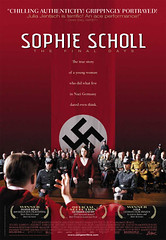Sophie Scholl: The Final Days
I am a huge fan of historical/epic films and films based on true-life events; especially if they portray courage and selflessness in the face of extreme pressure. There are simply too numerous to name but a big time favorite is Schindler's List. A more recent one would be Hotel Rwanda. Last week another great film of this genre premiered here. Although I was in a solemn mood last weekend, I went ahead to watch it anyway. It turned out to be an experience that is both shattering and ultimately uplifting.
Sophie Scholl: The Final Days, is a true story of Germany's most famous anti-Nazi heroine. This german gem uncovers a slice of European history many of us are not familiar with. Drawing on interviews with survivors and transcripts of Scholl's interrogation and incarceration that had remained hidden in East German archives until 1990, director Marc Rothmund expertly brought to thrilling life the final days of Sophie's life: a fast-moving, feverish account of six days, from arrest to interrogation, trial and sentence. It was nominated for an Academy Award for Best Foreign Language Film in January 2006.
In 1943, as Hitler continues to wage war across Europe, a group of college students mount an underground resistance movement in Munich. Dedicated expressly to the downfall of the monolithic Third Reich war machine, they call themselves the White Rose. Sophie Scholl is one of its few female members. She's an enthusiastic, appealing student with an irrepressible zeal for the truth. She helps her brother Hans, also a member of the White Rose, produce and distribute pamphlets that describe how the Third Reich caused the massacre at Stalingrad and forced Jews into concentration camps. But when she was captured during a nerve-wrecking covert operation to distribute pamphlets on university campus with her brother, the true tests of her character begin. The virtue and verve that Scholl demonstrated, first in deceiving her interrogators, and later in endeavoring to save her friends and family from execution, will amaze you. Unwavering in her convictions and loyalty to the White Rose, her cross-examination by the Gestapo quickly escalates into a searing test of wills as Scholl delivers a passionate call to freedom and personal responsibility that is both haunting and timeless. She demonstrated extraordinary faith in God all the way to the time of her execution and relied heavily on Him for strength.
On February 22, 1943, Sophie, her brother Hans and their friend Christoph Probst were found guilty of treason and condemned to death by head judge of the court. They were beheaded in the Munich-Stadelheim prison only a few hours later. The sentence was carried out with startling promptness. Because of the movie title we are not surprised, but we are jolted. Following her death a copy of the sixth leaflet was smuggled out of Germany through Scandinavia to England, and in mid-1943 millions of propaganda copies were dropped over Germany from Allied planes, now retitled as "The Manifesto of the Students of Munich." She embodies the adolescent faith that any political action is better than none. Today, more than a hundred German schools are named after her, and Jentsch's portrayal of Scholl may just inspire more brave young souls to pursue their own quests of justice and truth against all odds.
SOPHIE SCHOLL-THE FINAL DAYS received three Lolas (German Oscars) including the Audience Award and Best Actress Award to Jentsch for her brilliant characterization of the title role. The film also won two Silver Bears for Best Director and Best Actress at the 2005 Berlin International Film Festival.
For further information about Sophie, the White Rose and the film, check these out.
Sophie Scholl - here and here.
The White Rose
The Final Days official site
Sophie Scholl: The Final Days, is a true story of Germany's most famous anti-Nazi heroine. This german gem uncovers a slice of European history many of us are not familiar with. Drawing on interviews with survivors and transcripts of Scholl's interrogation and incarceration that had remained hidden in East German archives until 1990, director Marc Rothmund expertly brought to thrilling life the final days of Sophie's life: a fast-moving, feverish account of six days, from arrest to interrogation, trial and sentence. It was nominated for an Academy Award for Best Foreign Language Film in January 2006.
In 1943, as Hitler continues to wage war across Europe, a group of college students mount an underground resistance movement in Munich. Dedicated expressly to the downfall of the monolithic Third Reich war machine, they call themselves the White Rose. Sophie Scholl is one of its few female members. She's an enthusiastic, appealing student with an irrepressible zeal for the truth. She helps her brother Hans, also a member of the White Rose, produce and distribute pamphlets that describe how the Third Reich caused the massacre at Stalingrad and forced Jews into concentration camps. But when she was captured during a nerve-wrecking covert operation to distribute pamphlets on university campus with her brother, the true tests of her character begin. The virtue and verve that Scholl demonstrated, first in deceiving her interrogators, and later in endeavoring to save her friends and family from execution, will amaze you. Unwavering in her convictions and loyalty to the White Rose, her cross-examination by the Gestapo quickly escalates into a searing test of wills as Scholl delivers a passionate call to freedom and personal responsibility that is both haunting and timeless. She demonstrated extraordinary faith in God all the way to the time of her execution and relied heavily on Him for strength.
On February 22, 1943, Sophie, her brother Hans and their friend Christoph Probst were found guilty of treason and condemned to death by head judge of the court. They were beheaded in the Munich-Stadelheim prison only a few hours later. The sentence was carried out with startling promptness. Because of the movie title we are not surprised, but we are jolted. Following her death a copy of the sixth leaflet was smuggled out of Germany through Scandinavia to England, and in mid-1943 millions of propaganda copies were dropped over Germany from Allied planes, now retitled as "The Manifesto of the Students of Munich." She embodies the adolescent faith that any political action is better than none. Today, more than a hundred German schools are named after her, and Jentsch's portrayal of Scholl may just inspire more brave young souls to pursue their own quests of justice and truth against all odds.
SOPHIE SCHOLL-THE FINAL DAYS received three Lolas (German Oscars) including the Audience Award and Best Actress Award to Jentsch for her brilliant characterization of the title role. The film also won two Silver Bears for Best Director and Best Actress at the 2005 Berlin International Film Festival.
For further information about Sophie, the White Rose and the film, check these out.
Sophie Scholl - here and here.
The White Rose
The Final Days official site
rk



1 Comments:
I'm definitely going to look for this movie.
Post a Comment
<< Home